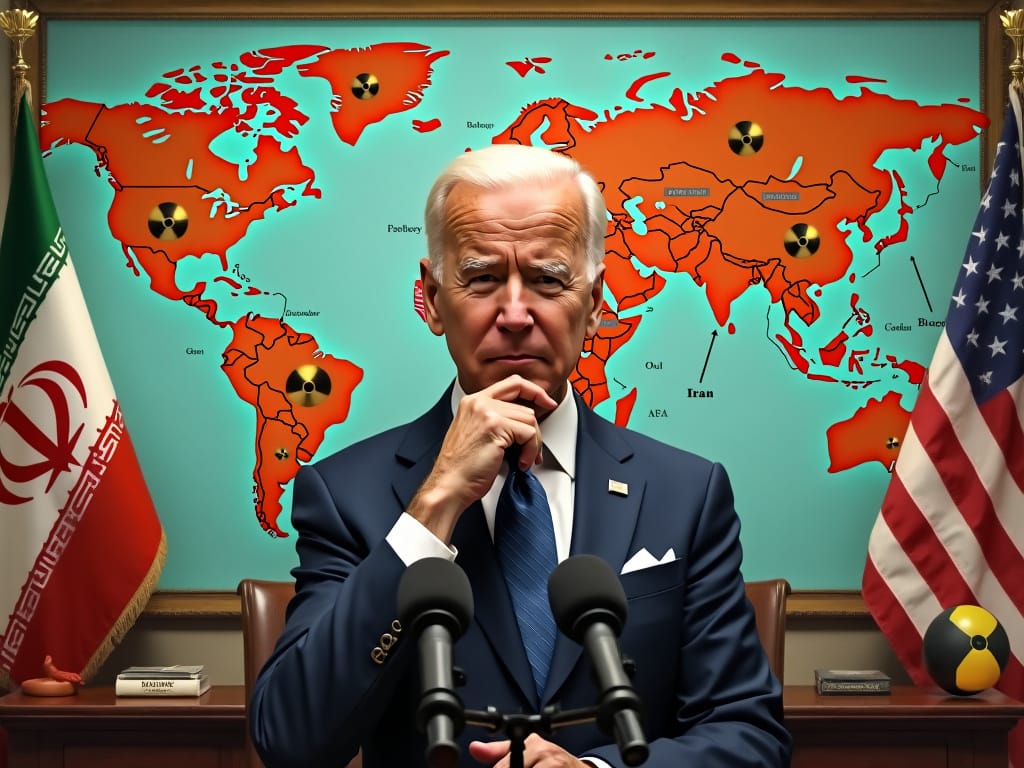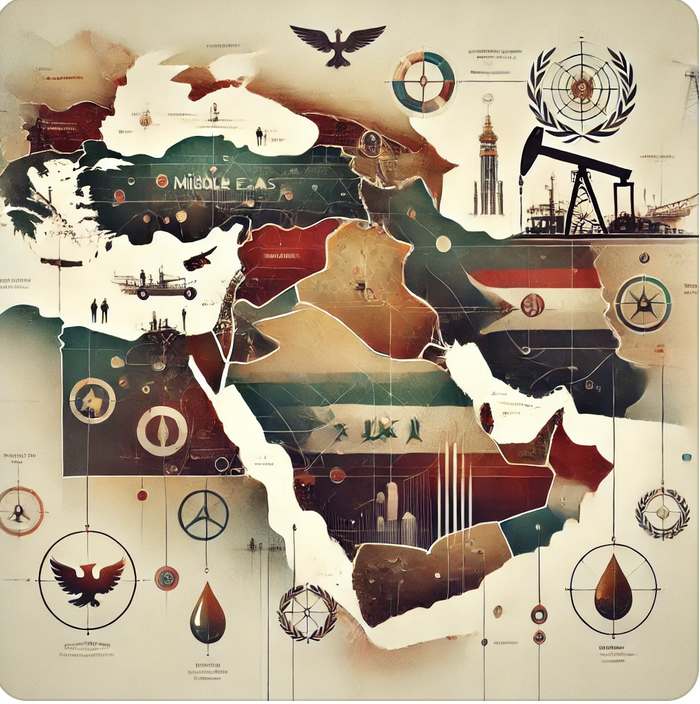

By Dr. Tim Orr
In the high-stakes world of international geopolitics, where nuclear ambitions, ideological fervor, and regional dominance collide, diplomacy is often championed as the civilized path to peace. But what happens when that path leads straight into the hands of a regime that thrives on revolution rather than reason? As the Biden administration continues to place its hopes on re-engaging Iran through negotiations, it is crucial to ask whether this strategy is fundamentally flawed. Is the U.S. dangerously underestimating the Islamic Republic of Iran—a regime that sees conflict as a necessary tool for ideological conquest rather than a burden to be avoided? The implications of this policy extend far beyond the Iranian nuclear program. At stake is nothing less than global stability, the balance of power in the Middle East, and the future of Western diplomacy.
Progressive ideals, rooted in utopian visions of a world characterized by equality, justice, and peace, often inform foreign policy decisions. These ideals prioritize dialogue, negotiation, and multilateralism, with the underlying assumption that all nations desire stability and economic prosperity. Joe Biden's foreign policy reflects these progressive tendencies, particularly in his emphasis on diplomacy with adversarial states such as Iran. For many progressives, the belief that nations act in their rational self-interest lies at the heart of diplomatic engagement. However, in the case of Iran, this optimistic view of human nature may be dangerously misguided.
The Flaw in Biden’s Approach: A Diplomatic Gamble with High Stakes
While progressive ideals emphasizing diplomacy and global cooperation are laudable in theory, they run into serious complications when confronted by regimes driven more by ideology than pragmatic concerns. Biden’s foreign policy towards Iran appears to be built on the premise that rational actors can be persuaded to change their behavior through negotiation and goodwill. The assumption is that Iran, facing significant economic hardship due to sanctions and domestic unrest, will prioritize economic relief over its long-standing revolutionary goals. Yet, history has shown that Iran’s leadership, deeply entrenched in its Shiite theocratic ideology, is not a typical rational actor in the international arena.
The Iranian regime has consistently demonstrated a willingness to sacrifice economic well-being and political stability in pursuit of its broader revolutionary objectives. This revolutionary vision is not merely about Iran’s domestic or regional influence; it is a global ideological struggle against what it perceives as Western imperialism, secularism, and Zionism. To fully understand the stakes of Biden’s policy, it is essential to recognize the ideological motivations that drive Iran’s leadership—a motivation far more powerful than economic incentives or diplomatic promises.
The Biden administration’s reliance on diplomacy assumes that Iran’s leaders can be swayed by the promise of economic relief, as exemplified by the revival of the Joint Comprehensive Plan of Action (JCPOA). While this approach may seem pragmatic at first glance, it fundamentally misreads the nature of the Iranian regime. The JCPOA, centered on freezing Iran’s nuclear ambitions in exchange for lifting economic sanctions, is predicated on the belief that Iran’s leadership values economic stability over its revolutionary principles. However, this assumption ignores decades of Iranian foreign policy, where ideology has consistently trumped pragmatism.
Understanding Iran’s Revolutionary Ideology: The Real Motivator Behind Foreign Policy
To grasp the full implications of Biden’s approach, exploring the ideological roots underpinning Iran’s foreign policy is necessary. Since the 1979 Islamic Revolution, Iran’s theocratic leadership has pursued a distinctly ideological agenda, shaped by the teachings of Ayatollah Khomeini. Khomeini framed the revolution not simply as a national event but as the beginning of a global Islamic movement that sought to resist Western dominance and establish a new world order based on Islamic governance. This revolutionary vision extends far beyond Iran’s borders, and its impact is felt throughout the region, particularly in its support for proxy groups like Hezbollah and Hamas.
The Islamic Republic views itself as the vanguard of a larger Shiite-led resistance against both Western and Sunni dominance in the Muslim world. This worldview is shaped by a belief that Iran has a religious and moral obligation to export its revolutionary ideology and resist any attempts by external powers to undermine it. This revolutionary commitment is not a temporary political strategy; it is embedded in the very identity of the regime. As a result, Iran’s foreign policy decisions are often made to advance this ideological struggle, even when such decisions come at great economic or political cost.
This ideological commitment has led Iran to pursue policies that defy rational self-interest in the conventional sense. Despite crippling economic sanctions and internal unrest, Iran has continued to fund and support militant groups across the Middle East, including Hezbollah in Lebanon, Hamas in Gaza, and various Shiite militias in Iraq and Syria. These groups are extensions of Iran’s revolutionary agenda, spreading its influence and destabilizing the region. Iran’s support for these groups is not driven by pragmatism; it is part of a broader ideological war against Israel, the U.S., and their allies. In this context, Biden’s reliance on diplomacy appears dangerously naive, as it assumes that Iran’s leadership will prioritize economic recovery over its revolutionary goals.
The Problem with Diplomacy: Why Iran’s Proxies Highlight the Flaws in Biden’s Strategy
The Biden administration’s approach to Iran is further complicated by the regime’s use of proxy groups to advance its ideological agenda. Hezbollah, Hamas, and other Iran-backed militias are not simply tools of Iranian foreign policy; they are ideologically aligned with Iran’s broader revolutionary objectives. These groups view their struggle not in terms of territorial gains or political power but as a religious and ideological mission to destroy Israel, resist Western influence, and establish an Islamic order in the Middle East.
The slogan of Hamas, "We love death more than you love life," encapsulates the ideological extremism that drives these groups. This is not the behavior of rational actors who can be persuaded to negotiate for peace. Rather, it reflects a deep-seated commitment to martyrdom and violence as legitimate means of achieving ideological goals. Iran’s leadership uses these groups to wage an asymmetric war against Israel and the West while maintaining plausible deniability. In doing so, Tehran avoids confrontation with its adversaries while advancing its revolutionary agenda.
Biden’s reliance on diplomacy and economic incentives to curb Iran’s influence over these proxies is based on the flawed assumption that Tehran will act in its best interest if offered the right incentives. However, Iran’s leadership defines its self-interest not in terms of peace or economic stability but in advancing its revolutionary goals through conflict. This is why Iran continues to fund and support proxy groups that engage in violent campaigns, even when doing so exacerbates its economic problems at home.
Lessons from History: The Dangers of Appeasement
History offers valuable lessons about the risks of relying too heavily on diplomacy with ideologically driven regimes. One of the most infamous examples is British Prime Minister Neville Chamberlain’s policy of appeasement toward Nazi Germany in the 1930s. Chamberlain believed that Adolf Hitler’s expansionist ambitions could be tempered through diplomatic concessions, assuming that Hitler was primarily motivated by grievances stemming from the Treaty of Versailles. This belief was rooted in the progressive assumption that rational negotiation could resolve even the most serious geopolitical conflicts.
However, Hitler’s ambitions were not about territorial adjustments; a militant ideology of domination and genocide drove them. Chamberlain’s failure to recognize this led to the disastrous policy of appeasement, which only encouraged Hitler and allowed him to prepare for war. The lesson here is that ideological regimes—whether Nazi Germany or Iran’s theocracy—cannot be appeased through diplomacy alone. Biden’s approach to Iran reflects a similar philosophical error: assuming that Tehran’s behavior can be moderated through economic relief and negotiation, even as Iran’s leadership continues to prioritize its ideological goals, such as resisting Israel and spreading its influence across the Middle East.
The Nuclear Ambition: Iran’s Dangerous Gambit and Biden’s Miscalculation
Perhaps the most dangerous aspect of Biden’s policy is its failure to address the broader context of Iran’s nuclear ambitions. The Biden administration’s focus on reviving the JCPOA overlooks the fact that Iran’s pursuit of nuclear weapons is not just about acquiring a deterrent—it is about reshaping the balance of power in the Middle East. A nuclear-armed Iran would not only enhance Tehran’s regional influence but also provide the regime with the security it needs to pursue its revolutionary goals more aggressively.
A nuclear-armed Iran would encourage the regime to act even more recklessly, knowing that its nuclear capabilities would deter international intervention. This would not only destabilize the Middle East but also make it nearly impossible for the U.S. and its allies to contain Iran’s ideological war against Israel and the West. The progressive assumption that Iran can be persuaded to abandon its nuclear ambitions through economic relief ignores the ideological nature of the regime’s goals. For Iran, the nuclear program is not just about national security—it is about advancing its revolutionary agenda on the global stage.
Conclusion: The Dangers of Progressive Idealism in Foreign Policy
Joe Biden’s foreign policy toward Iran, shaped by progressive ideals emphasizing diplomacy and global cooperation, is dangerously disconnected from the realities of global geopolitics. Iran, driven by a revolutionary ideology that prioritizes conflict over peace, cannot be appeased through economic incentives or diplomatic outreach alone. The regime’s ideological aggression must be confronted with strength and resolve, not with the hope that it will act in its own best interest.
While diplomacy should not be entirely abandoned, it must be paired with credible deterrence. The West, particularly the United States, must recognize that peace can only be secured through a balance of strength and engagement. If the Biden administration continues to rely solely on diplomatic appeasement, it risks encouraging Iran and other adversaries who interpret such policies as signs of weakness. True peace is not merely negotiated—it is achieved by demonstrating the strength and resolve necessary to deter aggression.
Tim Orr is a scholar, Evangelical minister, conference speaker, and interfaith consultant with over 30 years of experience in cross-cultural ministry. He holds six degrees, including a master’s in Islamic studies from the Islamic College in London. Tim taught Religious Studies for 15 years at Indiana University Columbus and is now a Congregations and Polarization Project research associate at the Center for the Study of Religion and American Culture at Indiana University Indianapolis. He has spoken at universities, including Oxford University, the University of Tehran, and mosques throughout the U.K. His research focuses on American Evangelicalism, Islamic antisemitism, and Islamic feminism, and he has published widely, including articles in Islamic peer-reviewed journals and three books.
Check out Dr. Orr's Articles on Middle East Analysis
 Dr. Tim Orr's BlogDr. Tim Orr
Dr. Tim Orr's BlogDr. Tim Orr
Check out Dr. Orr's Articles on Islamic Antisemitism
 Dr. Tim Orr's BlogDr. Tim Orr
Dr. Tim Orr's BlogDr. Tim Orr
Sign up for Dr. Tim Orr's Blog
Dr. Tim Orr isn't just your average academic—he's a passionate advocate for interreligious dialogue, a seasoned academic, and an ordained Evangelical minister with a unique vision.
No spam. Unsubscribe anytime.
